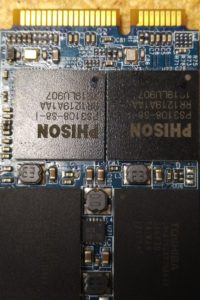Integrated RAID 0 mSATA SSD
 Have an SSD from a Acer Aspire S5 or Acer Aspire S7 that just doesn’t seem to work when you remove it from your system? This is likely because you didn’t notice that the SSD is actually two SSDs on a single circuit board in a custom setup where they are merged into a single larger capacity SSD using RAID 0 striping.
Have an SSD from a Acer Aspire S5 or Acer Aspire S7 that just doesn’t seem to work when you remove it from your system? This is likely because you didn’t notice that the SSD is actually two SSDs on a single circuit board in a custom setup where they are merged into a single larger capacity SSD using RAID 0 striping.
What does RAID 0 (striping) mean?
The two SSD drives are merged together like a zipper at the sector level. The first 128 sectors are written to the first drive, the next 128 sectors to the second, the next 128 sectors to the first and so on. In order to recover the data, it is necessary to build a custom solution to allow interfacing with the second SSD. By striping data across two or more drives, the capacity and speed of the storage is improved significantly. Unfortunately, there is no redundancy with RAID 0. If one drive fails, then entire contents across all the drives is lost.
Some models of mSATA RAID 0 SSD from Acer Aspire S5 and S7 laptops known by Recovery Force, thus far:
Kingston SMSR150S3
Lite-On CMT-256L6M
Lite-On CMT-256L3M
Phison SSE256GTTCR-S80
Our team is equipped to handle the recovery of data from integrated RAID SSDs like these very quickly and at our base data recovery rate for a 2 drive RAID 0.
If you have an integrated RAID 0 SSD from any model of laptop, computer or tablet and are looking for a way to recover your data, contact the team at Recovery Force to find out how to find out how we can help.
Is Your Data Backed Up?
Are you sure? As a professional data recovery lab, we get lots of data recovery projects from clients who have their data backed up. At least that is what they were made to believe? Here are a few things to check to confirm that your data is truly backed up: If you...
Social Media and Recovery Force Data Recovery
Over the past few years, the Recovery Force Team has been trying to embrace the new world of tweets and likes and have had various levels of success. That being said, since our signing onto various social media sites, we have evolved to the point where we, at least...
10 Most Common Reasons for Data Loss in 2013
Over the past year, the most common reasons for data loss we encountered are the following, in no particular order: Dropped Hard Drive Head Failure Corrupt Firmware Overwritten Data Flood and Fire Spilled Liquid / Dropped in Water Stuck Read/Write Heads Multiple Drive...